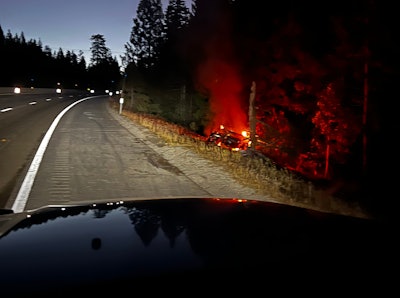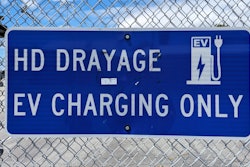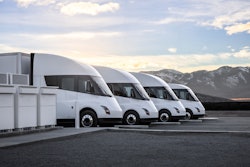
Interstate 80 eastbound was closed for nearly an entire day after a Tesla Semi caught fire east of Nyack early Monday, according to the California Department of Forestry and Fire Protection (Cal Fire).
California Highway Patrol (CHP) Gold Run Area Office said the all-electric rig, which was not hauling a trailer and registered to Tesla, veered off eastbound I-80 near the offramp for Laing Road and crashed into trees. Fire crews received the call just after 3 a.m. CHP is still investigating the crash but said no one was injured.
Westbound lanes of I-80 reopened about 4:30 p.m. Monday, CHP said, while the eastbound lanes reopened after 7 p.m. – roughly 16 hours after the crash.
A spokesperson for Cal Fire Nevada-Yuba-Placer told CCJ Tuesday morning his unit dumped "thousands – many thousands" gallons of water on the blaze. A Cal Fire aircraft dropped fire suppressant on and around the Semi as flames threatened to runaway in the roadside brush. The fire was contained to the shoulder of the interstate, Cal Fire told CCJ.
Monday's incident highlights the gaps and dangers between battery electric technologies and first responders.
"EV fire training is significant and ongoing as we learn more about EV fire behavior," Mary Eldridge, information officer for Cal Fire Nevada-Yuba-Placer, told CCJ Tuesday. "[Monday] was our first EV semi incident. A full report is due to the Chief but we learned about the length of thermal runaway and burn down times; coordination of water application versus burn down time; high-level thermal and air monitoring developing trends and much more."
Cal Fire Division Chief Ryan Woessner told KCRA news the interstate was closed "the keep the public safe from driving through the toxic fumes" put off by the burning lithium ion batteries.
"This was a hazmat incident with a fire component with limited extension of fire to the vegetation," Eldridge told CCJ.
Woessner noted that fighting the fire was problematic because as the batteries degrade, they start to catch fire "using the battery itself as fuel," and the intense heat, which can reach upwards of 1,000 degrees, is only further stoked until all the batteries have burned themselves out.
"This is new technology for us," he told the TV station. "We are learning with the engineers as we work through this process and, so far, the name of the game for us is to wait it out."
Despite taking deposits for Semi orders on launch day in 2017 Tesla has delivered very few trucks, with PepsiCo getting the lion's share. Tesla said in April first vehicle deliveries are planned for late 2025, with external customers starting in 2026. Dan Priestley, senior manager of Tesla's Semi program, confirmed in May that remains the plan.
NFI (CCJ Top 250, No. 20) on Tuesday said it has kicked off a Tesla Semi pilot "over the past few weeks," in Patterson, California.
"Our team delivered goods on routes between 250-450 miles, supported by fast charging infrastructure," the company said. "Over 6,000 miles the Semi demonstrated an efficiency of 1.64 kWh per mile, with 60% of those miles covered at speeds of 50 mph or greater, enabling us to evaluate more sustainable solutions for our customers."
NFI's 1.64 kWH per mile figure is slightly better than the 1.7 kWh per mile figure Priestley said in May Semi has shown internally and with PepsiCo.











